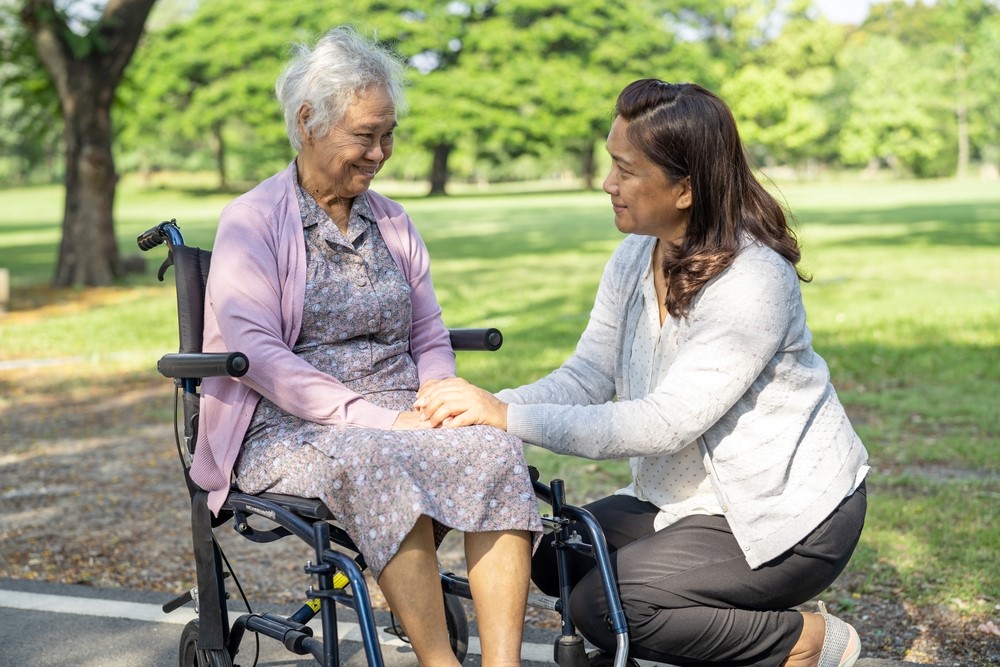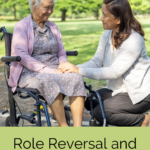
The term role reversal often comes up when talking about caregiving. It’s a logical idea, right? Suddenly you’re the one telling your parents what they need to do, trying to cajole them into a doctor’s visit, or even helping them out in the bathroom.
How do you cope with this role reversal when caring for aging parents?
There are plenty of approaches that you can take to support yourself as a caregiver, including self-compassion techniques and learning to set boundaries.
But, there’s something even more critical to talk about.
To put it simply – caregiving isn’t a role reversal.
Sure, the situation can feel like a role reversal at times, like when you’re trying to prevent yet another incontinence accident. Yet, there are also some clear differences, ones that need to considered.
Why There Isn’t Really a Role Reversal When Caring for Aging Parents
Your Legal Responsibility Isn’t the Same
When children are young, you have certain legal responsibilities. It’s your job to meet their basic needs, to make sure they’re educated, and to address any medical concerns.
Most of the time, the same isn’t true with aging parents.
Unless they’re legally in your care, you’re not responsible for their needs. You might still choose to support them, but this is choice rather than obligation (a distinction that changes the dynamic considerably).
Also, you may not have the legal right to make decisions for them. Most seniors are considered mentally competent enough to make their own decisions. That includes bad decisions and ones you don’t agree with.
Children Are Growing
Children are learning, growing, and developing. They will eventually become independent adults, with their own lives and ambitions.
Essentially, raising children is a process of preparing them for the rest of life. You’re teaching them skills that they’re going to need and helping them to critically think for themselves.
This isn’t the case for aging parents.
Your parents have already had a decent life. They’re no longer in that early phase of growth. They haven’t been for a long time.
As such, they’re not learning and getting more independent. Many will become more dependent as they age instead, meaning that you can’t assume things will get easier over time.
As such, you need to pace yourself.
Think of your caregiving journey as a long-haul journey, where you need to keep enough reserves in your body and mind to keep providing support for months or perhaps years.
Children Need to Learn
Teaching children is a crucial aspect of parenting.
Indeed, parents need to make key decisions for their children, as children are often too young to make wise decisions themselves. The ability to make good decisions and to understand the world is learned as children grow.
Your parents aren’t in this situation. Not even a little.
They don’t need to be taught to make good decisions. They’ve made decisions their whole life.
You can still work with them, and help them to figure out the challenges of aging and the next steps for their lives. The trick is to make this a collaborative process. Aging parents often resent it when their adult children overstep.
Wouldn’t you? How many of us would be happy with someone stepping in and telling us how to live?
They’re Still Your Parent

Even if your mother or father is now completely dependent on you, they’re still your parent. Their health challenges don’t take this away, nor do they remove all the shared history you have.
Seriously. You may have 50 years or more of on and off contact with your parents. That’s a lot of history.
They may also know more than you in some areas. After all, they’ve been around for longer and have lived through parts of history that you never experienced. This is why it’s important to stay respectful.
The shared history can also create tension.
Parents aren’t perfect. They would have made some less-than-ideal decisions when raising you, a pattern that can sometimes lead to tension.
Indeed, the shared history between you and your parent may mean you need to talk to a therapist or take the self-help angle with books like Adult Children of Emotionally Immature Parents or Setting Boundaries with Your Aging Parents.
Doing so isn’t a sign of failure at all. Most of us have things from our past that need working through. Doing so can help you to support your parents in the way they need, without bringing buried resentments and past hurts to the table.
They’re Suffering Losses
Having to rely on another person for help can be incredibly challenging. Many seniors were independent for most of their lives, but now find that they can’t do things on their own.
There may be a sense that their body is failing them or that they’re losing control.
This can be incredibly difficult, especially when one health problem quickly follows another. Reactions to these challenges vary, with some seniors becoming more dependent and other clinging to independence instead.
Regardless of how they respond, the loss of independence isn’t something that children normally experience.
What You Can Do As a Caregiver
Here’s another thing. Seeing caregiving as a role reversal can make things worse.
For one thing, you might end up treating your aging parent as a child.
Doing so can be horrible for them, as they’re a fully grown adult. They’ve lived a rich life and are generally still capable of making their own decisions.
Plus, aging parents are often already dealing with a loss of independence and all the emotions that come with this. Talking down to them or acting like your perspectives are superior is likely to just make things worse.
So then, what do you do?
Well, there are a few approaches that can make things better.
Identify Where They Need Help
The first step is to look at what your family member actually needs. What can they do on their own? Where are the gaps?
The goal here is to provide help in crucial areas, rather than trying to support your aging parent in every aspect of their life.
Most parents will be able to do some things on their own – and it’s healthy for them to keep doing so.
Keep Supporting Yourself Too

Again and again, caregivers are told to practice self-care.
It’s frustrating and tired advice, partly because all caregivers know that they need to support themselves. But, doing this well in practice is an entirely different story.
There are a few important approaches that can make things a bit easier here.
- Meet wants and needs early. Many of us default to addressing our wants and needs when they start to become urgent. This doesn’t work so well during caregiving, as your needs can easily intersect with a crisis. Our capacity model steps through an approach to help you to respond to your needs much earlier, giving you free energy and attention when you need it the most.
- Actually identify your needs. Our wants and needs aren’t always what we assume. It’s often worth digging a little deeper to identify where we truly are. Doing so then means that we’re actually addressing the things that truly matter.
- Practice self-compassion. Self-compassion is all about being kind to yourself. It’s especially important to caregivers, as it gives you a way to support yourself, even when there’s a crisis unfolding all around you.
- Look for the small things. Self-care often feels overwhelming because you barely have enough time or energy as-is. However, self-care doesn’t need to be big or scary. If practiced regularly, even tiny self-care practices can be powerful.
- Work on mindset and personal growth. Finally, your experience of caregiving isn’t just related to what’s happening. Work on your mental health and mindset can help to change how you interpret the situation, potentially making it easier to see the positive features.
Navigate the Change in Relationship
While there isn’t a true role reversal when caring for aging parents, the dynamics of your relationship do change. They have to, as the adult child is now more involved in their parent’s life and may be helping to make crucial decisions.
It’s often important to sit down and talk things through.
This gives you and your parents the chance to be clear about who is doing what and what the expectations are. Such conversations can sometimes be challenging, but they’re still well-worth having (the book Difficult Conversations can help make this process easier).
Learn When to Step Back
It’s also essential to learn when to let aging parents make their own decisions – even if those aren’t always great.
Let’s be realistic here.
Making decisions for yourself is a big part of being an adult. Many of those choices could be called good and healthy. They’re the ones that help us to thrive.
We’ve all made some pretty bad decisions too, along with plenty that could have been worse but could have been better too.
Unless your parent is officially ruled as being incompetent, then they have the right to make whatever decisions they want. This includes blowing all their money, eating junk food, or putting off a doctor’s appointment.
Treating your parent like a child and trying to push them into specific decisions won’t go well for either of you. You’ll just be fighting an uphill battle and they’re likely to start resenting you.
Instead, it’s best to learn when to step back.
You’ll probably still be giving advice and perhaps suggesting a particular course of action, like reminding your parent about why they need to drink more water or visit the doctor.
The trick is to leave it there. Don’t keep pushing the same advice if your parent doesn’t want to follow it.
This can be challenging emotionally, but that’s something for you to work with on your own.
Don’t Treat Them Like a Child
Finally, please, treat your aging parent like an adult – even if they are cognitively impaired. Remember that they have a life filled with experience and have plenty of opinions.
Plus, you’re still their child. They’re still your parent. No amount of caregiving or cognitive decline changes these facts.
Communicating helps here. This includes being honest about difficult things, as a lack of honesty can quickly lead to confusion and resentment.
Communication includes taking the time to listen. Really pay attention to what your aging parent struggles with, how they feel, and what is concerning them – even if you have a different perspective. Sometimes people simply need to talk things out.
Feeling Overwhelmed?
Check out our Caregiving Consulting service for personalized support and guidance.


Leave a Reply